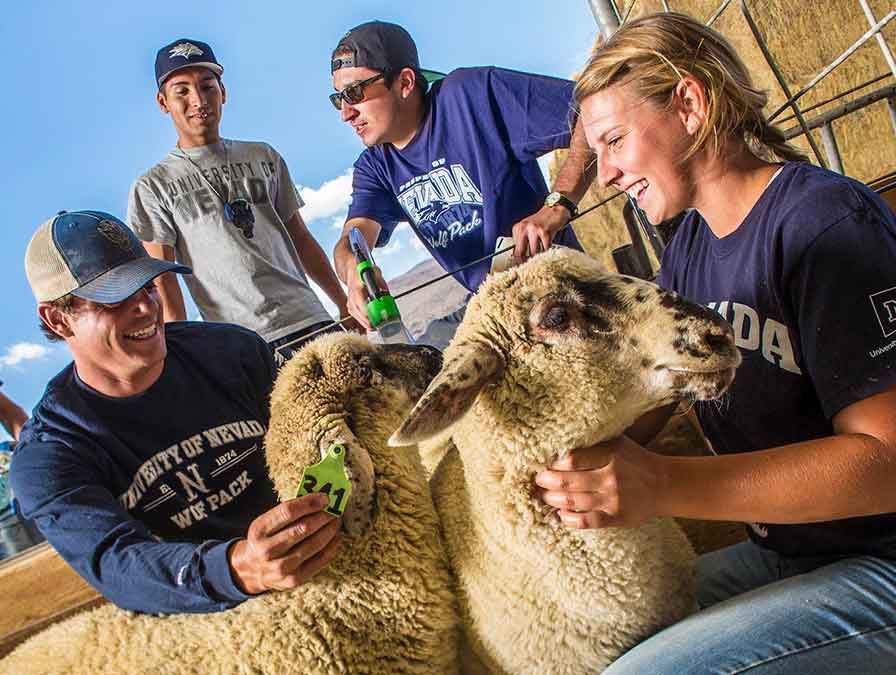Opportunity U sat down with Mike Teglas, professor of veterinary microbiology at the University of Nevada, Reno, to talk about what high schoolers can do to start their career in veterinary medicine.
Opportunity U: Starting off, for high school students that think they're interested in becoming a veterinarian, what does that process look like from high school to veterinary school?
Mike: For the American system, veterinary school is a separate four-year program beyond college. So, they would have to get into college, take the prerequisite courses and then apply separately to what's called the American Veterinary Medical Association (AVMA) accredited program. There are veterinary programs all over the world, but if it's not AVMA accredited, then they can't come back and work as a licensed veterinarian very easily. So, that's one of the things I always tell people: make sure that the program is accredited.
Veterinary school is like medical school. It's very, very competitive and in some cases, it's more competitive because there's only, I want to say, 33 veterinary schools in the entire country. For students in high school, they need to start thinking about how they can maintain their grades. The application process includes work and experiences that were done in high school, so they could start keeping track of their veterinary experiences and animal experiences all the way back in high school, leadership experiences, those kinds of things.
Good grades, animal experience crucial for high school students
Opportunity U: What are some experiences that high schoolers could get?
Mike: All of the veterinary school admissions committees are looking at your grades. So, grades are number one that gets your foot in the door. If you meet that grade expectation level, then they look at the rest of your application and on of the really important things for successful applicants to have is veterinary experience.
Students absolutely have to have worked with a licensed practicing veterinarian. And in most cases, they want you to work with multiple veterinarians in multiple medical modalities. If you work with a dog and cat small animal veterinarian, then you should also consider shadowing a cow, or food animal veterinarian, or equine veterinarian.
Schools want you to start to see what it's like. Once they accept an individual into their program, that seat is saved for them for the next four years. So if somebody drops out because they realize they hate being a veterinarian, well then that spot is lost for the continuation of their four-year period. So they really want to see that the applicants really have an idea of what they’re getting into. When we talk about the application process too, one of the letters of recommendation has to come from a practicing veterinarian as well.
But for high school, the big thing is to do really well in math so you can get all your college science classes, either taking them as honors or taking them in that first year or two of you undergraduate. That seems to be the biggest hurdle I see here is students coming in without doing well enough in their high school math, and then they're held back because they can't take the beginner biologies and chemistries until they have that done.
Request more info
Do you have more questions we can answer? Are you interested in receiving additional information about the University, the admissions process, applying, financial aid or more?
Opportunity U: So with those classes, are there any AP or IB credits that high schoolers could take that would benefit them in a pre-veterinary undergrad?
Mike: Yeah! Anything that would get them ahead of the game. There's a list of prerequisites for every single veterinary school that's maintained by the AVMA and every single vet school requires you to take a year of inorganic chemistry, at least a semester of organic chemistry, biochemistry, and then most of them make you take one or two semesters of physics. Anything that you can do to get those kinds of classes under your belt so you have more time and room for other courses in colleges is what I would recommend in high school.
Opportunity U: Are there any extracurriculars, maybe clubs or national organizations that you can think of that would help high schoolers?
Mike: 4-H would be one because there's both leadership and animal experience components. Veterinary schools are looking for people that have leadership experience and that have that animal experience. Students should have worked with multiple different kinds of animals and they should want to be a person that's comfortable with and likes animals in this career. Schools are looking for people that stand out. Not just good grades, but also good grades with involvement in the community. Community involvement of any sort is great. And animal experiences can include working with their own animals as well as things like equestrian events or rodeos. Those kinds of experiences all count for veterinary school.
Need for veterinarians high in rural areas
Opportunity U: Is there anything else that you think high schoolers should know or should consider if they're considering a career in veterinary medicine?
Mike: I guess one thing to mention is that right now, there's a shortage of veterinarians of all practice types. 70% of all veterinarians become small animal practitioners, and even those right now, there are more jobs than there are veterinarians to fill them. But especially in rural areas and in places where there's livestock or food animal work, those are also niches that have historically not been met. And so if you are interested in those things, there are even programs for people that come back after veterinary school to live and work in rural areas that help them pay off their student loan debt.
And like with everything else, students need to keep in mind that veterinary school is extremely expensive. The average person graduates with a $200,000 debt. The starting salaries for veterinarians have increased dramatically in the last five to seven years and so that's better, but you need to keep in mind how to moderate the amount of debt and get through college as cheaply as possible.
Opportunity U: Well thank you for taking the time to meet with us today and share all your knowledge about veterinary school!
 Catherine Schofield is a senior at the University of Nevada, Reno. She will be graduating in May 2022 with a Bachelor of Arts in journalism and dual minors in information systems and women’s studies. She is currently interning with the Office of Marketing and Communications and serving as social media manager for two Reynolds Media Lab accounts, The Reynolds Sandbox and Our Town Reno. She is passionate about new media and challenging herself to get more young people engaged with news online.
Catherine Schofield is a senior at the University of Nevada, Reno. She will be graduating in May 2022 with a Bachelor of Arts in journalism and dual minors in information systems and women’s studies. She is currently interning with the Office of Marketing and Communications and serving as social media manager for two Reynolds Media Lab accounts, The Reynolds Sandbox and Our Town Reno. She is passionate about new media and challenging herself to get more young people engaged with news online.
